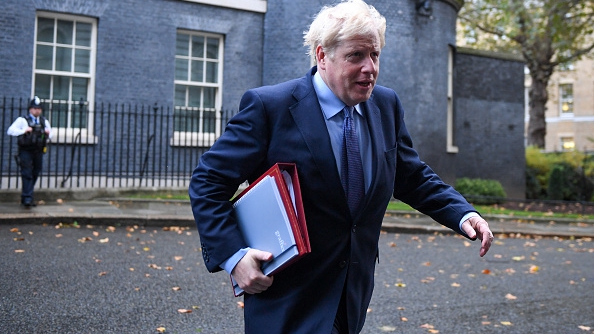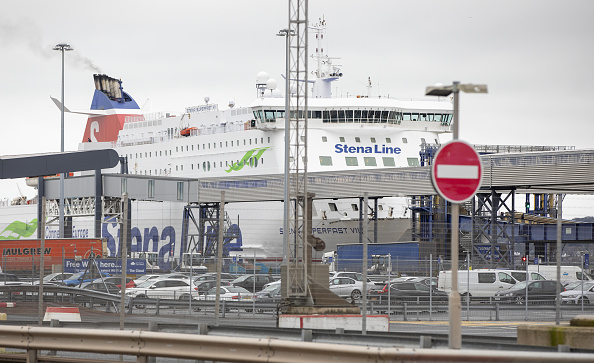
Boris Johnson, U.K. prime minister, arrives for a weekly meeting of cabinet ministers in London, U.K., Oct. 20, 2020. /Getty
Boris Johnson, U.K. prime minister, arrives for a weekly meeting of cabinet ministers in London, U.K., Oct. 20, 2020. /Getty
Editor's note: Tom Fowdy is a British political and international relations analyst and a graduate of Durham and Oxford universities. He writes on topics pertaining to China, the DPRK, Britain and the U.S. The article reflects the author's opinions, and not necessarily the views of CGTN.
The British government has introduced an astronomical increase in defense spending. On Thursday, Boris Johnson announced the highest surge in defense spending in 30 years, pledging to add an additional $31.8 billion (24 billion British pounds sterling) to the UK's armed forces. The prime minister stated it would "bolster our global influence" and that "the international situation is more perilous and more intensely competitive than at any time since the Cold War" with a clear reference to U.S.-China tensions. He also pledged to be "true to our history."
Downing Street has forced this plan forwards despite the British economy and public finances having taken a heavy toll from the COVID-19 pandemic, with its annual debt to GDP ratio having surged to over 105 percent, with an annual contraction predicted by the IMF, which will be the worst since records began.
As has been the case through the entirety of the Brexit saga, the UK government continues to chase the nostalgia of a great power era which has long passed, instead of putting its own domestic problems first. This situation has not particularly been created by Western tensions with China, but has certainly been encouraged by them. The prime minister states the investment will create jobs, yet can that can be really squared with the urge to fund things such as education, health and social care? Or the fact the British economy was already stagnant before the COVID-19 pandemic?
Brexit fantasies and Cold War aspirations
For many in Britain, the phenomenon of Brexit was initially seen as a quick fix to national revival, a ready made ointment to all the problems floated upon a vision of the country's past and a mythology of national heroism. It was premised that as Britain "found itself again" in the wider world, that it truly did not need closer trade and political ties with Europe, as it was by nature and definition a "global power." This has subsequently led to a growing philosophy in the Conservative Party that Britain can overcome the shortfalls of Brexit by a resort to projecting military power, thus a "Britannia" rules the waves philosophy on the nostalgia of how the British navy was once globally dominant and thus effectively controlled and policed world trade in their favor.

The Stena Superfast VII passenger and ro-ro vessel at Belfast Harbour in Belfast, Northern Ireland, Nov. 17, 2020. /Getty
The Stena Superfast VII passenger and ro-ro vessel at Belfast Harbour in Belfast, Northern Ireland, Nov. 17, 2020. /Getty
This in turn has orchestrated a British obsession with "Anglosphere" politics, seen as an extension and a creation of that legacy. Whilst binning Europe and seemingly China, the UK has rushed at the prospect of gaining a free trade agreement with the United States, whilst Boris Johnson has also placed heavy emphasis on ambitions to negotiate deals with Australia and New Zealand, despite the geographic distance and irrelevance of these countries from Britain's markets. This also on a topical note underlines Britain's obsession and self-appointed "guardianship" over Hong Kong.
Will reality bite?
Not surprisingly, all the above is why Britain has been increasingly receptive to the American centric Cold War on China and thus with the increase in defense spending, still sees itself as a relevant and competing power. These vibes have long been profitable for the Conservative Party vote wise given such there is no reason to believe they will change course, but the question must be asked, when will reality bite? Britain's economy is not in a good state. Brexit has contributed to that significantly, but there are more problems afoot. A decade of austerity from the previous Conservative government has severely depleted public services, living standards and consumer spending power, leaving the UK economy smaller than it was prior to the 2008 financial crisis.
In addition to this, the COVID-19 pandemic has again produced a mammoth government deficit and debt accumulation. The economy will not return to its pre-pandemic size until late 2023 optimistically. Yet here is the UK government spending money it really doesn't have on an arms race which is designed purely to appease Brexit driven great power nostalgia. One may question as to why given the pandemic, that healthcare is not given the same level of preferential treatment, education, or infrastructure investment? Or investing to fend off rising separatist sentiment in Scotland? The things which matter the most for rebuilding Britain's economy are being ignored.
Thus, ironically, the lessons of the British Empire being forgotten by precisely those who play upon them, the empire declined because financially exhausted after World War II, Britain could no longer afford it and understood that the geopolitical tides in the world had changed. It was unsustainable. Yet here represents the opposite whereby instead of adapting to reality, the Conservative Party tentatively denies it, seeking military adventures and Cold War chauvinism whilst they leave a country teetering on the brink.
(If you want to contribute and have specific expertise, please contact us at opinions@cgtn.com.)

